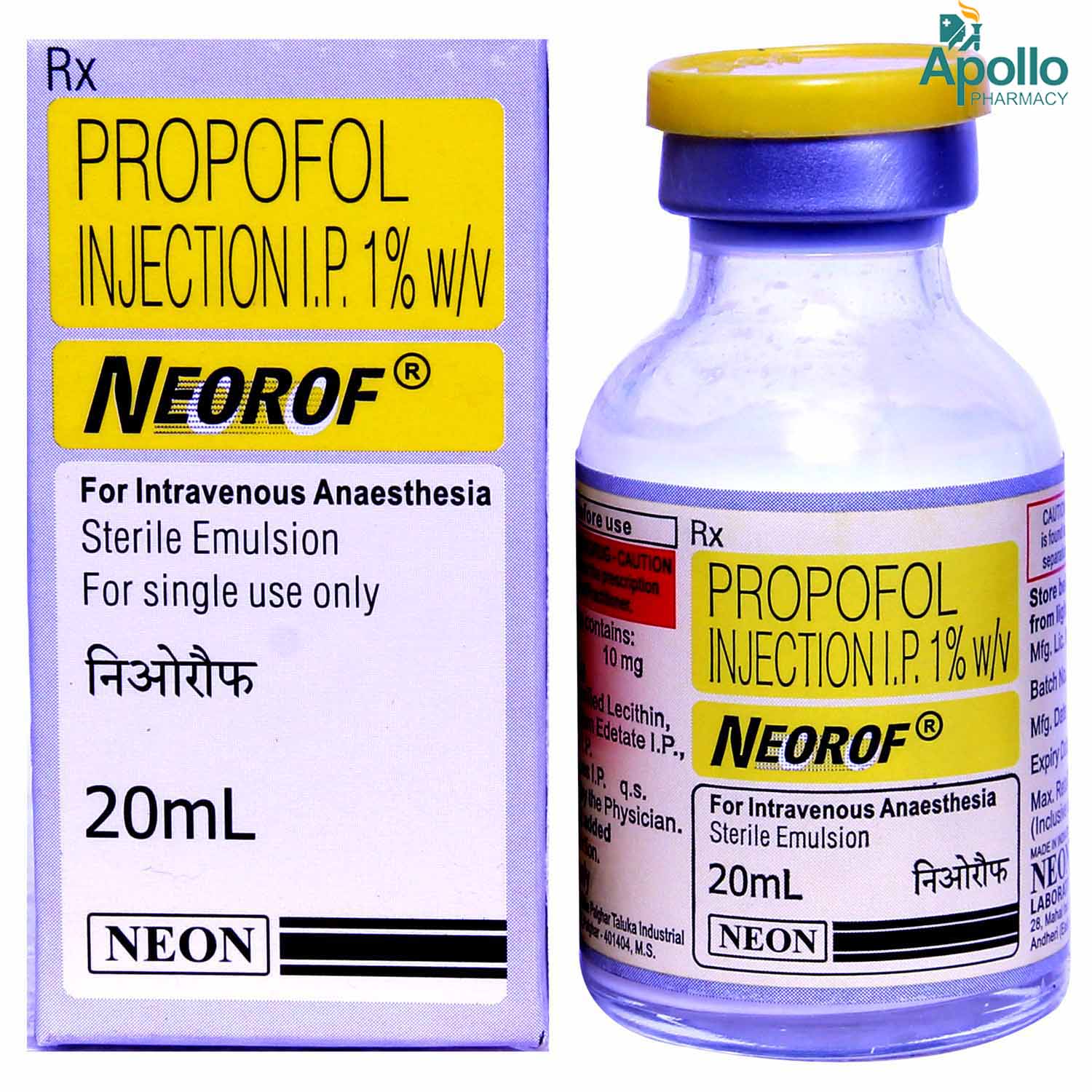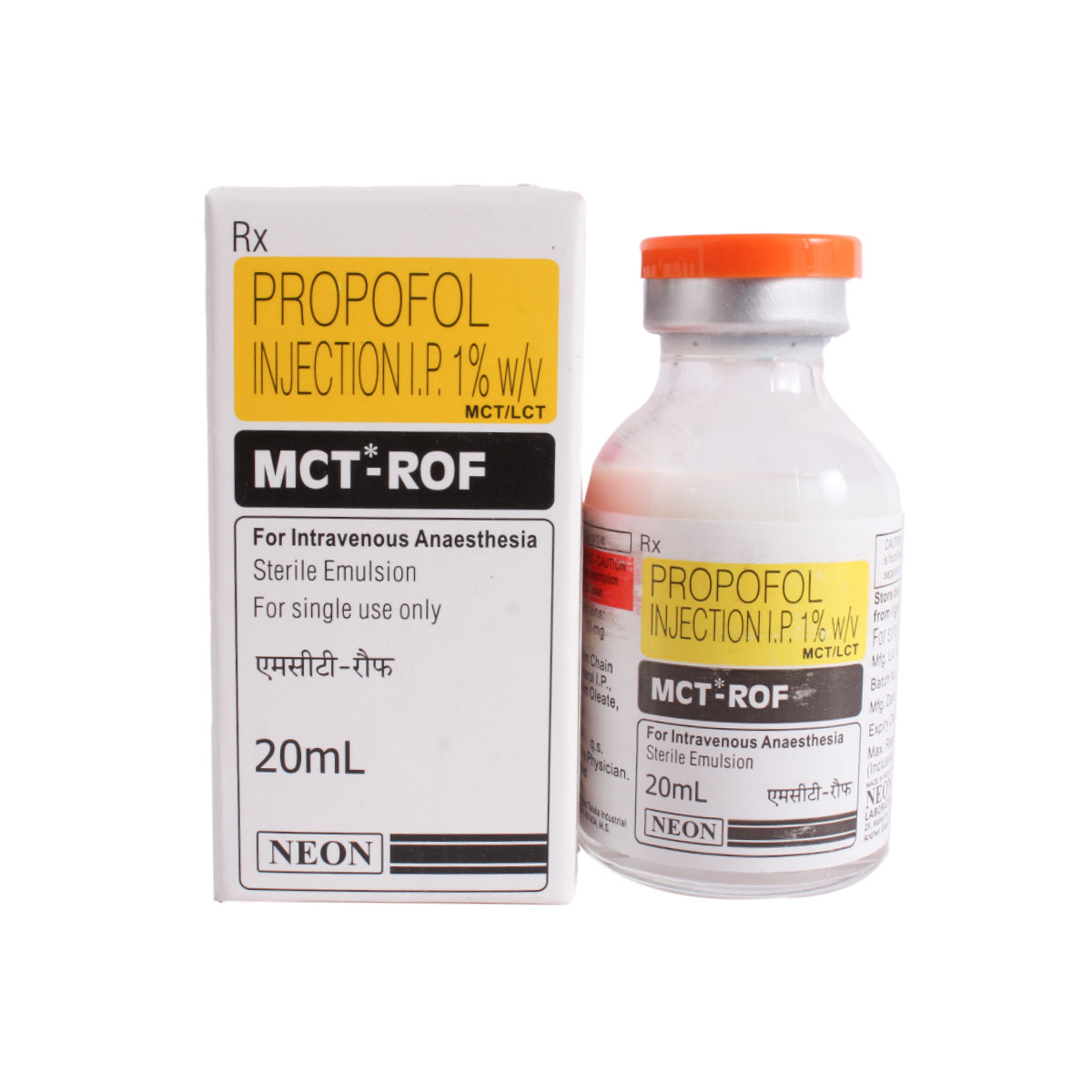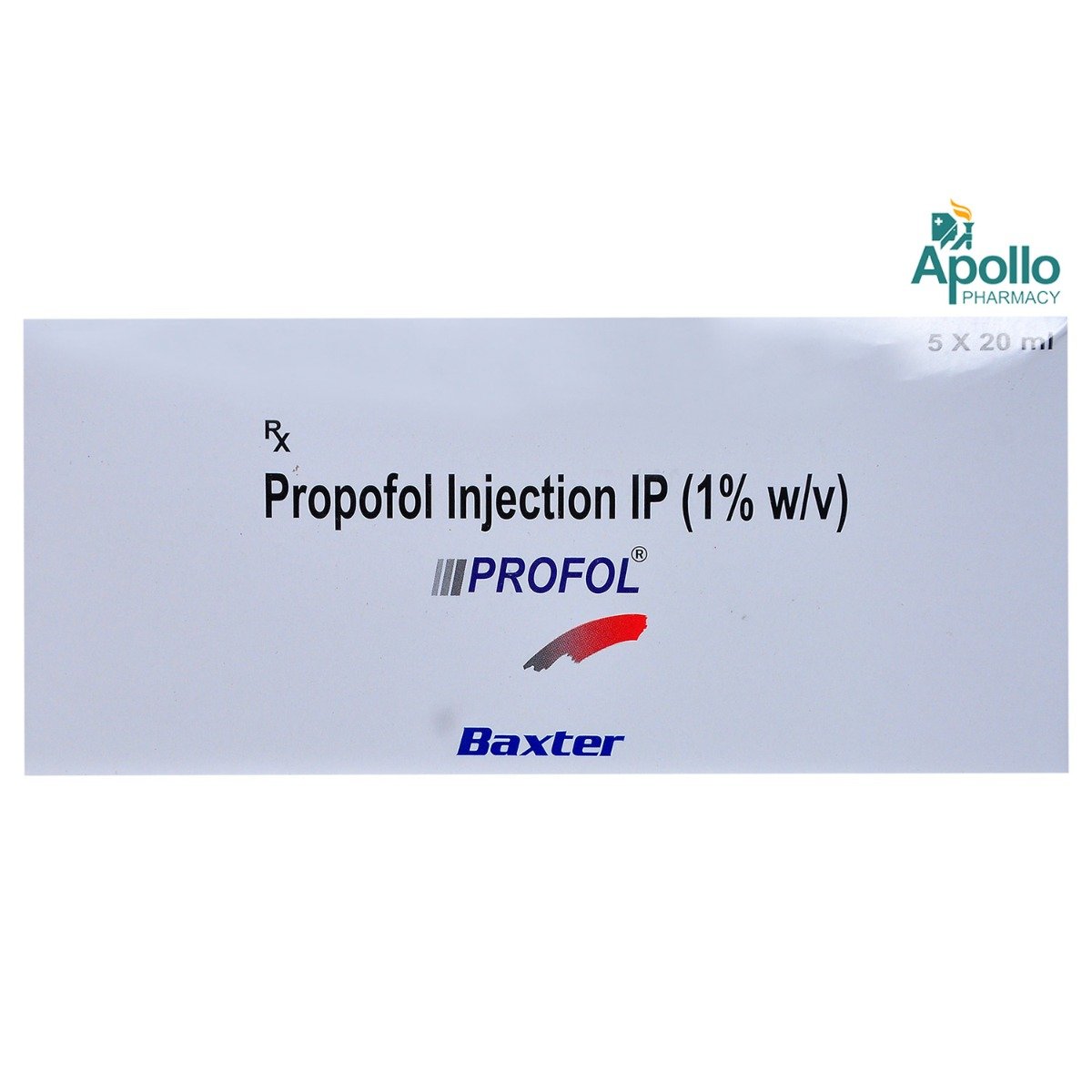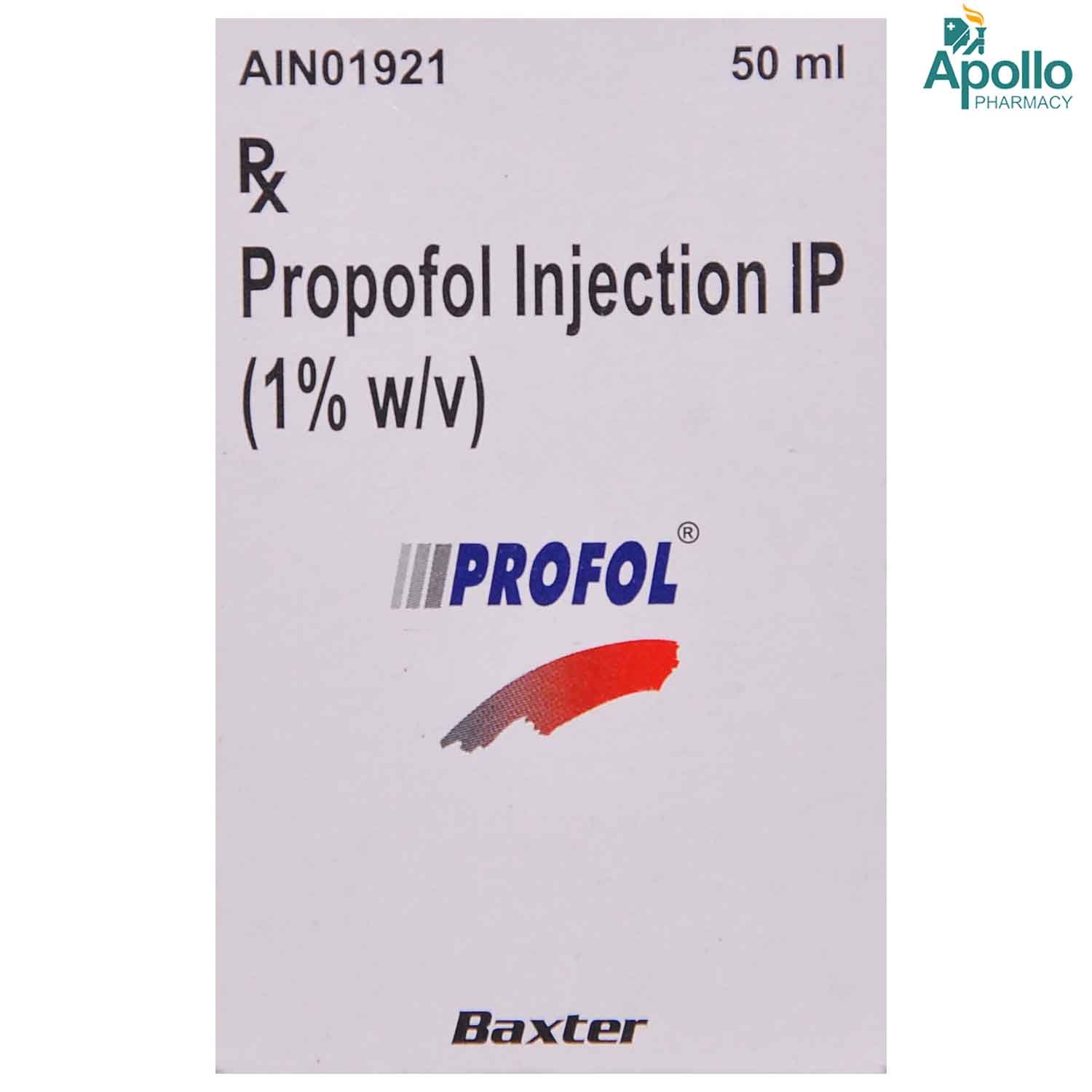Profol Spiva Injection 10 ml


MRP ₹210
(Inclusive of all Taxes)
₹31.5 Cashback (15%)
Selected Pack Size:10 ml
10 ml ₹189
(₹18.9 per ml)
Out of stock
50 ml ₹490.5
(₹9.81 per ml)
Out of stock
Provide Delivery Location
Online payment accepted
 Prescription drug
Prescription drugWhats That
Composition :
Manufacturer/Marketer :
Consume Type :
Expires on or after :
Return Policy :
About Profol Spiva 10ml Vial
Profol Spiva 10ml Vial belongs to a class of drugs known as 'general anesthetic', primarily used in giving anesthesia for major surgical procedures. It is given as induction therapy before surgery to sedate the patient. General Anaesthesia is a medication given before surgery to put you to sleep so that you do not feel the pain as you are unconscious.
Profol Spiva 10ml Vial contains Propofol, which is used as an anesthetic for surgeries so that procedure is carried out without pain and distress. It works by causing loss of consciousness, which is reversible. It generally slows down the brain and central nervous system, which is the conscious center.
Take Profol Spiva 10ml Vial as prescribed by your doctor. You are advised to take Profol Spiva 10ml Vial for as long as your doctor has prescribed it for you, depending upon your medical condition. In some cases, you may experience dizziness, hypotension (low blood pressure), nausea, headache, vomiting, local site pain, changes in your breathing pattern, slow heartbeat. Most of these side effects of Profol Spiva 10ml Vial do not require medical attention and gradually resolve over time. However, if the side effects are persistent, reach out to your doctor.
Do not take Profol Spiva 10ml Vial if you are allergic to Profol Spiva 10ml Vial or any of its ingredients. Profol Spiva 10ml Vial should always be given by a doctor or a trained professional as over-dose can cause excessive sedation, which can be fatal. Do not drive a car or operate any machinery as Profol Spiva 10ml Vial affects alertness. If you are pregnant, planning got conceive or are breastfeeding, Profol Spiva 10ml Vial should be taken only after informing your doctor.
Uses of Profol Spiva 10ml Vial
Directions for Use
Key Benefits
Profol Spiva 10ml Vial belongs to a class of drugs known as 'general anesthetic,' containing Propofol, primarily used in giving anesthesia for major surgical procedures. It allows the procedures to be carried out without pain and distress. It works by causing loss of consciousness, which is reversible. It generally slows down the brain and central nervous system, which is the conscious center. It is also used in people on a ventilator or who need critical care to sedate the patient.
Storage
- If you experience low blood pressure symptoms like dizziness, lightheadedness, or fainting while taking medication, seek immediate medical attention.
- Make lifestyle modifications and adjust your medication regimen under medical guidance to manage low blood pressure.
- As your doctor advises, regularly check your blood pressure at home. Record your readings to detect any changes and share them with your doctor.
- Fluid intake plays a vital role in managing blood pressure by maintaining blood volume, regulating blood pressure, and supporting blood vessel function. Drinking enough fluids helps prevent dehydration, maintain electrolyte balance, and regulate fluid balance.
- Take regular breaks to sit or lie down if you need to stand for long periods.
- When lying down, elevate your head with extra pillows to help improve blood flow.
- Avoid heavy exercise or strenuous activities that can worsen low blood pressure.
- Wear compression socks as your doctor advises to enhance blood flow, reduce oedema, and control blood pressure.
- If symptoms persist or worsen, or if you have concerns about your condition, seek medical attention for personalized guidance and care.
- Include omega-3 rich foods in your diet to reduce inflammation.
- Eat antioxidant-rich foods like fruits, vegetables, and nuts to promote overall skin health.
- Stay hydrated by drinking plenty of water.
- Maintain a healthy skin care routine, using gentle, fragrance-free products.
- Wear loose, breathable clothing to minimize irritation.
- Keep fingernails short and clean to prevent further skin damage.
- Use a humidifier to add moisture to the air, reducing dryness and itchiness.
- Practice stress-reducing techniques like meditation or deep breathing to manage stress levels.
- Change positions or take a break from activity to relieve symptoms.
- Avoid postures that put a lot of pressure on just one area of the body.
- If you have vitamin deficiency, take supplements or change your diet.
- Exercise regularly like cycling, walking or swimming.
- Avoid sitting with your legs crossed.
- Clench and unclench your fists and wiggle your toes.
- Massage the affected area.
- If you experience symptoms of low oxygen levels, such as shortness of breath, confusion, or chest pain, seek immediate medical attention.
- Inform your doctor about the medication you're taking and the symptoms you're experiencing. They will assess the situation and provide guidance.
- Your doctor may recommend monitoring your oxygen levels using a pulse oximeter.
- Your doctor may adjust your medication or recommend alternative treatments to alleviate low oxygen levels.
- In severe cases, your doctor may prescribe supplemental oxygen therapy to increase oxygen levels in the blood.
- Managing underlying conditions, such as respiratory or cardiovascular diseases, can help alleviate low oxygen levels.
- Engage in relaxation techniques, stay hydrated, avoid strenuous activities, get plenty of rest, and eat a balanced diet to help manage symptoms and improve overall well-being.
- Inform your doctor if you experience high blood pressure symptoms after starting a new medication or changing your medication regimen.
- To reduce high blood pressure symptoms, your doctor may change your medication regimen or dose.
- Monitor your blood pressure regularly to track changes and potential side effects.
- Make lifestyle changes, such as following a healthy diet, exercising regularly, and reducing sodium intake.
- Consider incorporating stress-reducing activities, like meditation or deep breathing exercises, into your daily routine.
- Create a personalized plan with your doctor to manage high blood pressure, which may include additional medications, therapies, or lifestyle modifications.
- Follow up with your doctor on a frequent basis to assess progress, change treatment plans, and address any concerns or issues.
- Exercising regularly helps lower the risk of heart problems.
- Maintain a healthy diet, including vegetables and fruits.
- Rest well; get enough sleep.
- Manage stress with yoga and meditation.
- Limit alcohol and smoking.
Drug Warnings
Do not take Profol Spiva 10ml Vial if you are allergic to Profol Spiva 10ml Vial or any of its ingredients. Profol Spiva 10ml Vial should always be administered by a doctor or a trained professional as over-dose can cause excessive sedation which can be fatal. Do not drive or operate any machinery as Profol Spiva 10ml Vial affects alertness. If you are pregnant, planning got conceive or are breastfeeding, Profol Spiva 10ml Vial should be taken only after informing your doctor. Maintain a gap of 24 hours after using Profol Spiva 10ml Vial and breastfeeding. The doctor will constantly monitor your blood pressure, oxygen level, breathing pattern and kidney function while the surgery goes on.
Drug-Drug Interactions
Drug-Drug Interactions
Login/Sign Up
Co-administration of Selegiline with Profol Spiva Injection 10 ml may significantly affect the blood pressure.
How to manage the interaction:
Taking Selegiline with Profol Spiva Injection 10 ml together can possibly result in an interaction, but it can be taken if a doctor has advised it. However, consult a doctor immediately if you experience any symptoms such as severe headache, blurred vision, confusion, fits, chest pain, nausea or vomiting, sudden numbness or weakness (especially on one side of the body), speech difficulties, fever, sweating, lightheadedness, and/or fainting Do not discontinue any medications without consulting a doctor.
Taking Tranylcypromine with Profol Spiva Injection 10 ml may significantly affect your blood pressure.
How to manage the interaction:
Taking Profol Spiva Injection 10 ml with Tranylcypromine is not recommended, but can be taken together if prescribed by a doctor. However, consult a doctor if you experience any unusual symptoms. Do not discontinue any medications without consulting your doctor.
Taking Phenylephrine with Profol Spiva Injection 10 ml may lead to increased levels of phenylephrine leading to side effects like high blood pressure.
How to manage the interaction:
Taking Phenylephrine with Profol Spiva Injection 10 ml is not recommended, but it can be taken if prescribed by the doctor. Do not discontinue the medications without consulting a doctor.
This raises the possibility of regurgitation while under anesthesia, leading to the inhalation of stomach contents into the lungs, which can result in lung inflammation or damage.
How to manage the interaction:
Talk to your doctor if you have any questions or concerns. Your doctor may be able to prescribe alternatives that do not interfere with the safety of your anesthesia. It is essential to inform your doctor about all other medications you are taking, including vitamins and herbal supplements. Do not stop using any medications without first talking to your doctor.
Drug-Food Interactions
Drug-Food Interactions
Login/Sign Up
Diet & Lifestyle Advise
- Do not consume alcohol while taking Profol Spiva 10ml Vial as it might increase the sedation.
- Eat a low-calorie diet generally home-cooked for a speedy recovery.
- Avoid junk food, oily and spicy food as you have undergone surgery.
- Also, in case of sleep disturbances, try to spend time with family, which will change your mood and help you to fall asleep.
- Limit the screen time as it also alters your sleep cycle.
Side Effects of Profol Spiva 10ml Vial
- Hypotension (low blood pressure)
- Nausea
- Headache
- Vomiting
- Dizziness
- Local site pain
- Changes in your breathing pattern
- Slow heartbeat
Habit Forming
Therapeutic Class
All Substitutes & Brand Comparisons
RX
Not for online saleFresofol 1% Injection 20 ml
Fresenius Kabi India Pvt Ltd
₹136.5
(₹6.01/ 1ml)
68% CHEAPERRX
Not for online saleNeorof Injection 20 ml
Neon Laboratories Ltd
₹136
(₹6.12/ 1ml)
67% CHEAPERRX
Not for online saleMct-Rof 20ml Injection
Neon Laboratories Ltd
₹136
(₹6.12/ 1ml)
67% CHEAPER
Product Substitutes
Drug-Diseases Interactions
Drug-Diseases Interactions
Login/Sign Up
FAQs
Drug-Drug Interactions Checker List
- RIFAMPICIN
- LORAZEPAM
- DIAZEPAM
- DILTIAZEM
- VERAPAMIL
- CIPROFLOXACIN
- FUROSEMIDE
- MIDAZOLAM
- ALPRAZOLAM
Special Advise
- Do not self administer Profol Spiva 10ml Vial. It should be done by a doctor only.
- Constant monitoring of breathing pattern, blood pressure, oxygen levels, kidney function is required.
Disease/Condition Glossary
General Anaesthesia: It is a medication given before surgery to put you to sleep so that you do not feel the pain as you are unconscious. It is more than sleep as the brain does not respond to the pain signals. A trained person who is specialized in anaesthesia generally gives the anesthesia as an intravenous infusion or injection form.

Have a query?
Buy best Anaesthetics products by
Neon Laboratories Ltd
Themis Pharmaceutical Ltd
Troikaa Pharmaceuticals Ltd
Samarth Life Sciences Pvt Ltd
Abbott India Ltd
Astra Zeneca Pharma India Ltd
Baxter India Pvt Ltd
Core Claris Lifesciences Ltd
Celon Laboratories Pvt Ltd
Ajanta Pharma Ltd
Miracalus Pharma Pvt Ltd
Torrent Pharmaceuticals Ltd
Zydus Cadila
AP Pharmaceutical
Fresenius Kabi India Pvt Ltd
Galpha Laboratories Ltd
Indoco Remedies Ltd
Anglo French Drugs & Industries Ltd
B Braun Melsungen AG
Cadila Pharmaceuticals Ltd
Claris Lifesciences Ltd
Dr Reddy's Laboratories Ltd
Elder Pharmaceuticals Ltd
Fortel Life Sciences
Hetero Healthcare Pvt Ltd
Icpa Health Products Ltd
Pure Derma Healthcare Pvt Ltd
Salve Pharmaceuticals Pvt Ltd
Sunways (India) Pvt Ltd
VARENYAM HEALTHCARE PVT LTD
Wockhardt Ltd
Zydus Healthcare Ltd
6Ipain Healthcare Pvt Ltd
Admac Lifesciences(Oncology)
Aesmira Lifesciences Pvt Ltd
Albatross Healthcare Pvt Ltd
Amwill Healthcare Pvt Ltd
Anchal Life Science Pvt Ltd
Atopic laboratories Pvt Ltd
Biovenice Criticure
Cellgen Biopharma
Cipla Ltd
Delvin Formulations (P) Ltd
Entod Pharmaceuticals Ltd
Ethinext Pharma
Foremost Marketing Pvt Ltd
Fusion Health Care Pvt Ltd
German Remedies Ltd
Global Dent Aids Pvt Ltd
Greycells Lifesciences Pvt Ltd
Himeros Pharmaceuticals Pvt Ltd
Ici India Ltd
Icpa Lab
Ikon Remedies Pvt Ltd
Intas Pharmaceuticals Ltd
Kopran Laboratories Ltd
Kshipra Health Solutions
Leeford Healthcare Ltd
MSP Pharmaceuticals
Medimarck Biotech
Modi Mundipharma Pvt Ltd
Mylan Pharmaceuticals Pvt Ltd
Optima Healthcare Solutions
Pericles Pharma
Pharmadent Remedies Pvt Ltd
Piramal Enterprises Ltd
Pristine Pearl Pharma Pvt Ltd
Questus Pharma Pvt Ltd
Ranbaxy Laboratories Ltd
Rusan Healthcare Pvt Ltd
Scott Edil Pharmacia Ltd
Skinocean Pharmaceuticals
Themis Chemicals Ltd
Themis Medicare Ltd
Ultra Drugs Pvt Ltd
Vhb Life Sciences Inc
Zee Laboratories Pvt Ltd
Alcohol
Safe if prescribed
Profol Spiva 10ml Vial can affect alertness if taken along with alcohol. So, the consumption of alcohol should be avoided as it might further reduce alertness.
Pregnancy
Consult your doctor
Profol Spiva 10ml Vial is not recommended in the last trimester of the pregnancy as it may affect the baby's brain's growth.
Breast Feeding
Consult your doctor
Profol Spiva 10ml Vial is known to pass through the breastmilk. So, it is not advised to take Profol Spiva 10ml Vial during breastfeeding. Consult your doctor for further advice.
Driving
Safe if prescribed
Profol Spiva 10ml Vial can affect alertness and coordination as it is known to cause drowsiness. So, operating machinery which requires concentration should be avoided.
Liver
Consult your doctor
Profol Spiva 10ml Vial to be taken with caution, especially if you have had a history of liver disease. Your doctor will have to change the dosage depending on your medical condition and your reaction to treatment.
Kidney
Consult your doctor
Profol Spiva 10ml Vial to be taken with caution, especially if you have had a history of kidney disease. Your doctor will have to change the dosage depending on your medical condition and your reaction to treatment.
Children
Safe if prescribed
Profol Spiva 10ml Vial is not recommended for children below the age of 3 years. For children aged above three, take in dose and duration advised by a doctor.









